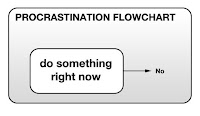Question
 "I have an 16-year-old child with ASD [level 1]. He is an excellent student now that he is doing his high school online through a public charter school. However, he has no concept of time so he is often cramming at the last minute to finish his assignments. How can I help him learn to manage his time better so that he can do his work without added stress and anxiety?"
"I have an 16-year-old child with ASD [level 1]. He is an excellent student now that he is doing his high school online through a public charter school. However, he has no concept of time so he is often cramming at the last minute to finish his assignments. How can I help him learn to manage his time better so that he can do his work without added stress and anxiety?"
Answer
Nothing creates stress and anxiety quite like procrastination. While some individuals are just natural procrastinators, others, like your child, have a genuine problem understanding the concept of time. This is a common characteristic of ASD [High-Functioning Autism].
Online schooling is a great option for teenagers with ASD. Removing the classroom distraction does wonders for your child's thought processes. The lessening of sensory assault, the one-on-one instruction, and no bullies are definite pluses! As an added thought, please consider social skills group classes and other social outlets to prevent total isolation. Clubs and community groups that are geared towards his special interests (i.e., history book club, chess club, and band lessons are common choices) will provide much needed social skills practice in a comfortable environment.
Organization is another weak area for many children with ASD. Since children on the spectrum are prone to struggle with depression, anxiety, and stress, the addition of poor organization can cause real problems. Organizational skills are necessary for young adults. High school teachers and college professors expect students to contribute acceptable work in a timely manner. Finding solutions that work now will lead to positive changes and less stress in the future.
Here are some things you can do to help your child manage his time better:
• Visual timers can be very helpful tools when organizational skills are being taught. These timers have a colored line that gets smaller as the time passes, giving the user a true visual image of running out of time. Each daily task or, in your child's case, each school subject, can be timed with the visual timer. Congratulations on finding the solution for your child's school issues. High school can be very overwhelming for teenagers with ASD. With your guidance and a plan of organization, your child is sure to finish high school and move on to adulthood ventures with confidence and control.
• Visual schedules are a necessary part of your child's routine. Use lists and reminders to keep him moving along. Encourage him to keep a daily, weekly, and monthly calendar. To do lists, written schedules, and assignment lists will give him the structure he needs to begin organizing his life.
• Designing an ordered workspace is a good place to start. A designated place for everything, comfortable seating, quiet surroundings, and a calming decor will help diminish distractions.
• Creating a routine is essential for your child. As an individual with ASD, he craves routine and order. A daily routine will set him on the right path. He may need guidance to develop a routine. Work with him to create a smooth flow to his day.
Resources for parents of children and teens on the autism spectrum:
==> How to Prevent Meltdowns and Tantrums in Children with Autism Spectrum Disorder
==> Parenting System that Reduces Defiant Behavior in Teens with Autism Spectrum Disorder
==> Launching Adult Children with Autism Spectrum Disorder: Guide for Parents Who Want to Promote Self-Reliance
==> Teaching Social-Skills and Emotion-Management to Children with Autism Spectrum Disorder
==> Parenting Children and Teens with High-Functioning Autism: Parents' Comprehensive Handbook
==> Unraveling the Mystery Behind High-Functioning Autism: Audio Book
==> Crucial Research-Based Parenting Strategies for Children and Teens with High-Functioning Autism
==> Parenting System that Reduces Defiant Behavior in Teens with Autism Spectrum Disorder
==> Launching Adult Children with Autism Spectrum Disorder: Guide for Parents Who Want to Promote Self-Reliance
==> Teaching Social-Skills and Emotion-Management to Children with Autism Spectrum Disorder
==> Parenting Children and Teens with High-Functioning Autism: Parents' Comprehensive Handbook
==> Unraveling the Mystery Behind High-Functioning Autism: Audio Book
==> Crucial Research-Based Parenting Strategies for Children and Teens with High-Functioning Autism
More articles for parents of children and teens on the autism spectrum:
Social rejection has devastating effects in many areas of functioning.
Because the ASD child tends to internalize how others treat him,
rejection damages self-esteem and often causes anxiety and depression.
As the child feels worse about himself and becomes more anxious and
depressed – he performs worse, socially and intellectually.
Click here to read the full article…
Click here to read the full article…
---------------------------------------------------------------
Meltdowns are not a pretty sight. They are somewhat like overblown
temper tantrums, but unlike tantrums, meltdowns can last anywhere from
ten minutes to over an hour. When it starts, the Asperger's or HFA child
is totally out-of-control. When it ends, both you and your child are
totally exhausted. But... don’t breathe a sigh of relief yet. At the
least provocation, for the remainder of that day -- and sometimes into
the next - the meltdown can return in full force.
Click here for the full article...
Click here for the full article...
--------------------------------------------------------------
Although Aspergers [high-functioning autism] is at the milder end of the
autism spectrum, the challenges parents face when disciplining a
teenager on the spectrum are more difficult than they would be with an
average teen. Complicated by defiant behavior, the teen is at risk for
even greater difficulties on multiple levels – unless the parents’
disciplinary techniques are tailored to their child's special needs.
Click here to read the full article…
Click here to read the full article…
------------------------------------------------------------
Your older teenager or young “adult child” isn’t sure what to do, and
he is asking you for money every few days. How do you cut the purse
strings and teach him to be independent? Parents of teens with ASD face
many problems that other parents do not. Time is running out for
teaching their adolescent how to become an independent adult. As one
mother put it, "There's so little time, yet so much left to do."
Click here to read the full article…
Click here to read the full article…
------------------------------------------------------------
Two traits often found in kids with High-Functioning Autism are
“mind-blindness” (i.e., the inability to predict the beliefs and
intentions of others) and “alexithymia” (i.e., the inability to
identify and interpret emotional signals in others). These two traits
reduce the youngster’s ability to empathize with peers. As a result, he
or she may be perceived by adults and other children as selfish,
insensitive and uncaring.
Click here to read the full article...
Click here to read the full article...
------------------------------------------------------------
Become an expert in helping your child cope with his or her
“out-of-control” emotions, inability to make and keep friends, stress,
anger, thinking errors, and resistance to change.
Click here for the full article...
------------------------------------------------------------
A child with High-Functioning Autism (HFA) can have
difficulty in school because, since he fits in so well, many adults
may miss the fact that he has a diagnosis. When these children display
symptoms of their disorder, they may be seen as defiant or disruptive.
Comments:
- Anonymous said...Has anyone looked into whether it is difficult for an individual with Asperger's to manage the assault of many emails a day coming into one's inbox? How does someone with Asperger's manage the constant contact modern technology requires? Thanks.
- Anonymous said... Visual timer!
- Max...Help him develop a schedule he can follow and put it where he can always see what he should be working on.
- Anonymous said...Perhaps he needs help or training in breaking down assignments into bites sizes. Time the bites and keep a journal of how long the bites take for a week so that he can learn how long specific tasks take. From these bite sizes a visual planner with the bites in place may help him stay on task... Also perhaps "first this then that" visual reminder so that he completes a needed bite (classwork) followed by a reward (use timers). These should help him feel successful in coursework and also feel rewarded as well as able to remain in control. Further these are huge skills that will later help him be successful in his employment.
- Anonymous said...Find some resources on mind maping - an excellent visual aide that will help him plan what information he knows, needs to find out, and then can be used to study. There are books detailing how to teach/learn the technique and also must be computer programmes too - I'm sure I have heard of these. He may also be a gestalt learner - and have trouble breaking his assignment down into smaller, more manageable chunks, meaning he is more likely to leave it to the last minute.
- Anonymous said...my son does online school (13 in 7th grade) and he thrives on a list for each day. He has a white board and puts each days list of classes in the order he plans to do them. He doesn't use this next idea, but my husband with ADHD does. A silent timer. You can see the hand ticking down without the annoying ticking sound. It will help him develop a sense of time going by as well.
- Anonymous said...Can I ask which online school he does. Mine does Connections.
- Anonymous said...Do you have specific schools over there for kids with Aspergers. (I mean not intergrated in mainstream schools but schools specifically for only ASD kids). from Australia.







